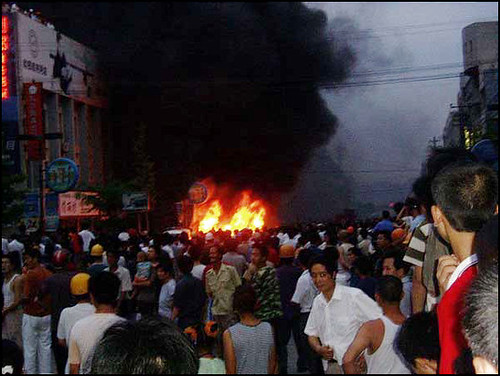Wave of Instability Reaches China’s Cities

The Washington Post reports on rising class warfare between the urban poor and the alliance of the state and its chosen investors:
After they saw what happened to Liu, Chizhou’s self-described “common people” rose up against what they perceived as their local government’s willingness to side with rich outside investors against Chizhou’s own. By the end of the evening, 10,000 Chizhou residents had filled the streets, some of whom torched police cars, pelted overwhelmed anti-riot troops with stones and looted a nearby supermarket bare.
The violence in downtown Chizhou startled the leaders of this forward-looking city of 120,000, set in the rich alluvial farmland of Anhui province near the Yangtze River, about 250 miles southwest of Shanghai. Dismayed city officials deplored the impact on their campaign to attract investment and broaden Chizhou’s economic base. “Illicit elements” were to blame, they said.
But the riot here, like a growing number of flare-ups in other Chinese cities, was in fact directed against the flourishing alliance of Communist Party officials and well-connected businessmen that runs Chizhou and many other cities across China. Before calm returned to the streets, the disturbance had become a political rebellion against the increasingly intimate connection in modern China between big money and Communist government.
It’s not the excess of capitalism that’s destabilizing China so much as the lack of it. What China has–an alliance between an authoritarian state and closed industries–is much closer to fascism than to capitalism. When the markets are not truly free and open, labor cannot bargain with those who run the “means of production,” government is unaccountable to the people, and courts do not dispense fair justice to ordinary people, legitimate and peaceful avenues to relieve popular grievances are closed off.
In which case, pressure can only build.